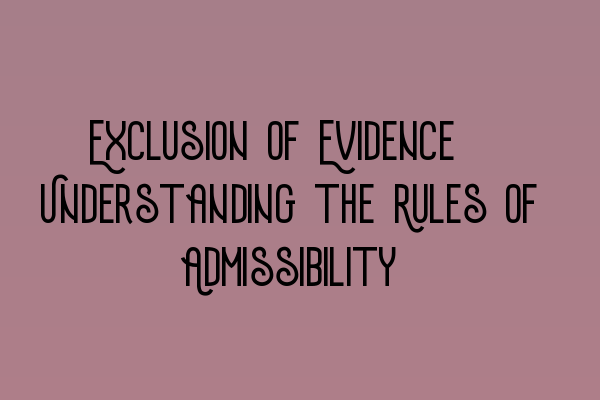Exclusion of Evidence: Understanding the Rules of Admissibility
Welcome to the SQE Criminal Law & Practice Law UK blog! In today’s post, we will delve into the intricate world of the exclusion of evidence and help you understand the rules of admissibility. As a criminal solicitor, it is crucial to master these rules to ensure a fair trial and protect your clients’ rights.
What is the Exclusion of Evidence?
The exclusion of evidence refers to the process of preventing certain evidence from being admitted in court proceedings. This exclusion can occur for various reasons, including violating the rules of admissibility. The rules of admissibility serve to maintain fairness, reliability, and integrity in the criminal justice system.
The Importance of Admissible Evidence
Admissible evidence is evidence that meets the requirements set forth by the law and can be presented in court. It is crucial to understand the rules of admissibility to ensure that evidence presented supports the case and holds up under scrutiny. Evidence that does not meet the criteria of admissibility may cause a case to collapse or be deemed unreliable, compromising the pursuit of justice.
Common Grounds for Exclusion
There are several grounds on which evidence may be excluded:
- Relevance: Evidence must be relevant to the case at hand. Irrelevant evidence may be excluded as it can distract the court from the main issues.
- Hearsay: Hearsay evidence, which is a statement made by someone other than the witness testifying, is generally inadmissible unless it falls under a recognized exception.
- Improperly Obtained Evidence: Evidence that has been obtained unlawfully or in breach of the defendant’s rights may be excluded. This includes evidence obtained through illegal searches or confessions obtained under duress.
These are just a few examples, and it is essential to consult the relevant legislation and case law to fully understand the grounds for exclusion.
Consequences of Exclusion
When evidence is excluded, it is vital to consider the potential impact on the case. Exclusion can significantly weaken the prosecution’s case or prevent the defense from presenting crucial evidence. As a solicitor, it is your responsibility to identify grounds for exclusion and effectively argue for their application in court.
Stay Updated with SQE Criminal Law & Practice Law UK
At SQE Criminal Law & Practice Law UK, we understand the importance of staying updated and well-prepared for the SQE exams. We offer comprehensive preparation courses for both SQE 1 and SQE 2, ensuring that aspiring solicitors have the knowledge and skills to succeed.
If you’re preparing for the SQE exams, we recommend checking out our SQE 1 Practice Exam Questions and SQE 1 Practice Mocks FLK1 FLK2 articles. These resources provide valuable practice and help you familiarize yourself with the exam format.
For further assistance with SQE preparation, explore our SQE 1 and SQE 2 Preparation Courses. Our expert tutors are well-versed in the intricacies of criminal law and are dedicated to helping you excel in the exams.
Remember to stay updated on the latest SRA SQE Exam Dates to ensure you’re well-prepared and ready to take the exams when the time comes.
Thank you for reading, and we hope this article has shed some light on the rules of admissibility and the importance of excluding evidence when necessary. Stay tuned for more informative posts from SQE Criminal Law & Practice Law UK!
